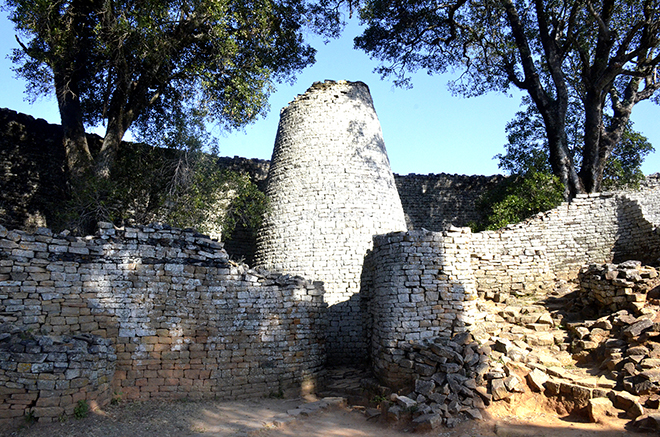Historicity in the eyes of Chimutashu

 Lovemore Ranga Mataire The Reader
Lovemore Ranga Mataire The Reader
THE first novel by Jackie Chimutashu titled The Great Enclosure: Book One, is a fictionalised narrative of the musings at Great Zimbabwe, which can also be read as a historical oral record of what led to the demise of one of the powerful empires to emerge out of pre-colonial Zimbabwe. Published by Author House in 2013, the book is unique and refreshing in its presentation of the goings on in the governance of Great Zimbabwe and the breakaway of Nyatsimba Mutota from the control of the powerful Emperor Hungwe.
Several issues tacked in the book that makes the reader have a better understanding of the intricate daily activities at the Great Zimbabwe. Far from the debasing colonial tales of savage kings, the life at Great Zimbabwe and all the vassals surrounding the empire comprised of well-organised social, political and economic spheres.
The Great Zimbabwe depended more on the allegiance and tributes from the surrounding chiefdoms for its survival and its continued exercise of power and control. Thus, the pertinent issues that are illuminated in the book include the influence of foreign traders in the political organisation of the empire, the significant role of mhondoros or spirit medium, the influential role of women especially emperor’s first wife and the reasons that would point to the eventual demise of the Great Zimbabwe.
It becomes clear as the book progresses that foreign traders were more than just bounty hunters but were also influential in exchanging news and brought with them an alternative way of life far beyond the borders of local kings and emperors.
So when an Arab trader visits the Great Zimbabwe and is given access to the Emperor, he is dazzled by the power that the emperor possesses and the intricate political, economic and social organisation that he compares the emperor to a deity. “My great esteemed Lord,” he (the Arab) began, “I have seen your massive walls and I have come to know that you are not savages as has been told us by those who have not had the rare opportunity of visiting your great nation.
“Yes, so much has been said about this Kingdom, the Kingdom of the Shona and now my own eyes have seen the power, wealth and vastness which you alone hold in your very hands.”
The Arab trader continues waxing lyrical about the grandeur of his Kingdom, comparing it to the ones in Egypt run by the Pharaohs who are literally worshipped by their subjects and were treated as gods or deities, thereby making them immortal. Because they held the position of gods to their people, they also held in their hands the unquestionable power to create and destroy all creatures under their authority. Their subjects treated them in high esteem and their godliness was passed on to the next reigning Pharaoh.
The narrator’s presentation of the Arab’s influence on the Emperor is refreshing in that it gives a new dimension hitherto highlighted by most historical narratives of the pre-colonial era. The Arab’s words are so powerful that they have a lingering effect on Emperor Hungwe, who started toying around the idea of being declared divine by his people whose belief in their ancestors who communicate with Mwari or Musikavanhu is unshakeable.
It is clear that the Emperor hungers for more power than the one he already possesses and this hunger for religious and political supremacy forces him to disregard long held cultural beliefs that have sustained the stability of the kingdom for generations.
While to his subjects, the Emperor exudes the image of a reserved individual difficult to fathom his inner thoughts, in reality he is actually a shrewd schemer who let others do his hatchet projects while he pretend to be simply being swept along by the political currents.
In order to execute his plan to be declared deity, he identifies critical people that are influential in mobilising people. He clearly understands that the battle at hand is that of the mind and seeks the assistance of his beautiful first wife who is much revered by his people to further identify individuals to carry out the ‘commissariat’ work for him.
One gets the sense that while spirit mediums were much revered in pre-colonial times, not all of them were without blemish and forthright.
The juxtaposition of Kwatara-the young forthright spirit mediums whose dreams have saved the kingdom from catastrophe and the sharp-tongued barren Chireshe who will not stand at anything as long as it gives him sexual satisfaction and the ultimate love of his life, the emperor’s first wife exemplifies the balance that existed among kingdom’s advisory council.
The Emperor’s first wife thus identifies Chireshe to carry out the task of swaying public opinion to declare Hungwe as divine and also to counter the resistance of Kwatara the forthright mhondoro who stands for the Mwari religion.
Besides Kwatara, the Emperor Hungwe has also to deal with one of his vassal Kings, the ambitious King Nyatsimba Mutota, who is planning a breakaway in manner that can also scuttle his plan to be declared divine.
In the end, the reader gets to understand the critical importance of salt in the livelihoods of the people of Great Zimbabwe as King Nyatsimba Mutota, as if by fate, is send by the emperor to look for salt in faraway lands in the Zambezi Valley.









Comments